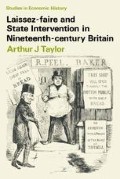Abstract
‘LAISSEZ-FAIRE has never been preached as an absolute dogma by any English economist.’12 Though few, if any, historians of economic thought can be found to disagree with this view, the tendency of the more widely read commentators in the interwar years was to establish a broad identity between the Classical School and the propagation of laissez-faire doctrine. Alexander Gray, for example, described Adam Smith as — the great apostle of laissez-faire’13 and Charles Rist similarly spoke of ‘the laissez-faire doctrine preached by the school of Adam Smith’14 (though he made clear the limits which Smith set to the application of the doctrine).
Preview
Unable to display preview. Download preview PDF.
Author information
Authors and Affiliations
Copyright information
© 1972 The Economic History Society
About this chapter
Cite this chapter
Taylor, A.J. (1972). The Theory of Economic Policy. In: Laissez-faire and State Intervention in Nineteenth-century Britain. Studies in Economic History. Palgrave, London. https://doi.org/10.1007/978-1-349-00661-8_3
Download citation
DOI: https://doi.org/10.1007/978-1-349-00661-8_3
Publisher Name: Palgrave, London
Print ISBN: 978-0-333-09925-4
Online ISBN: 978-1-349-00661-8
eBook Packages: Palgrave Business & Management CollectionBusiness and Management (R0)

